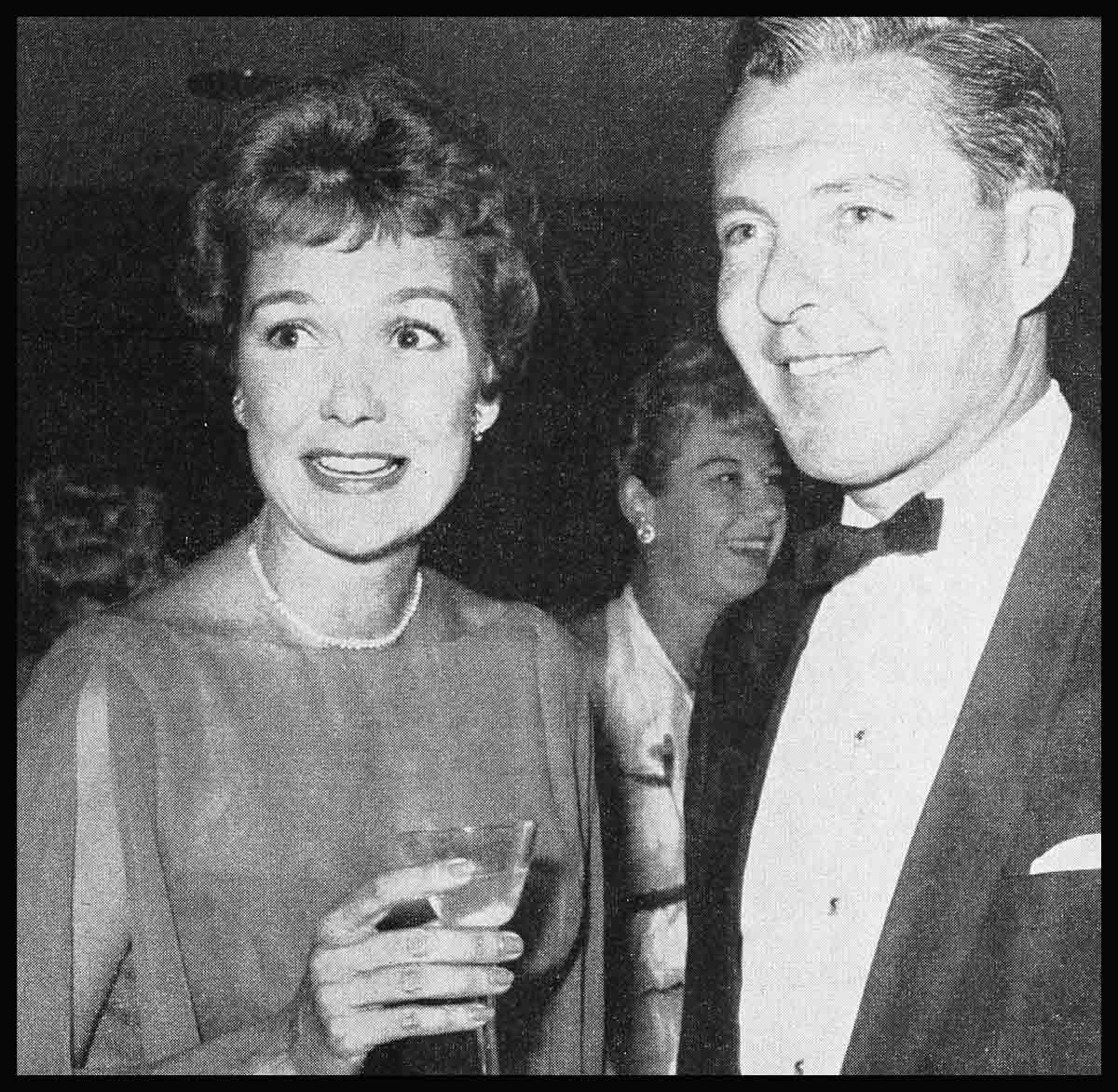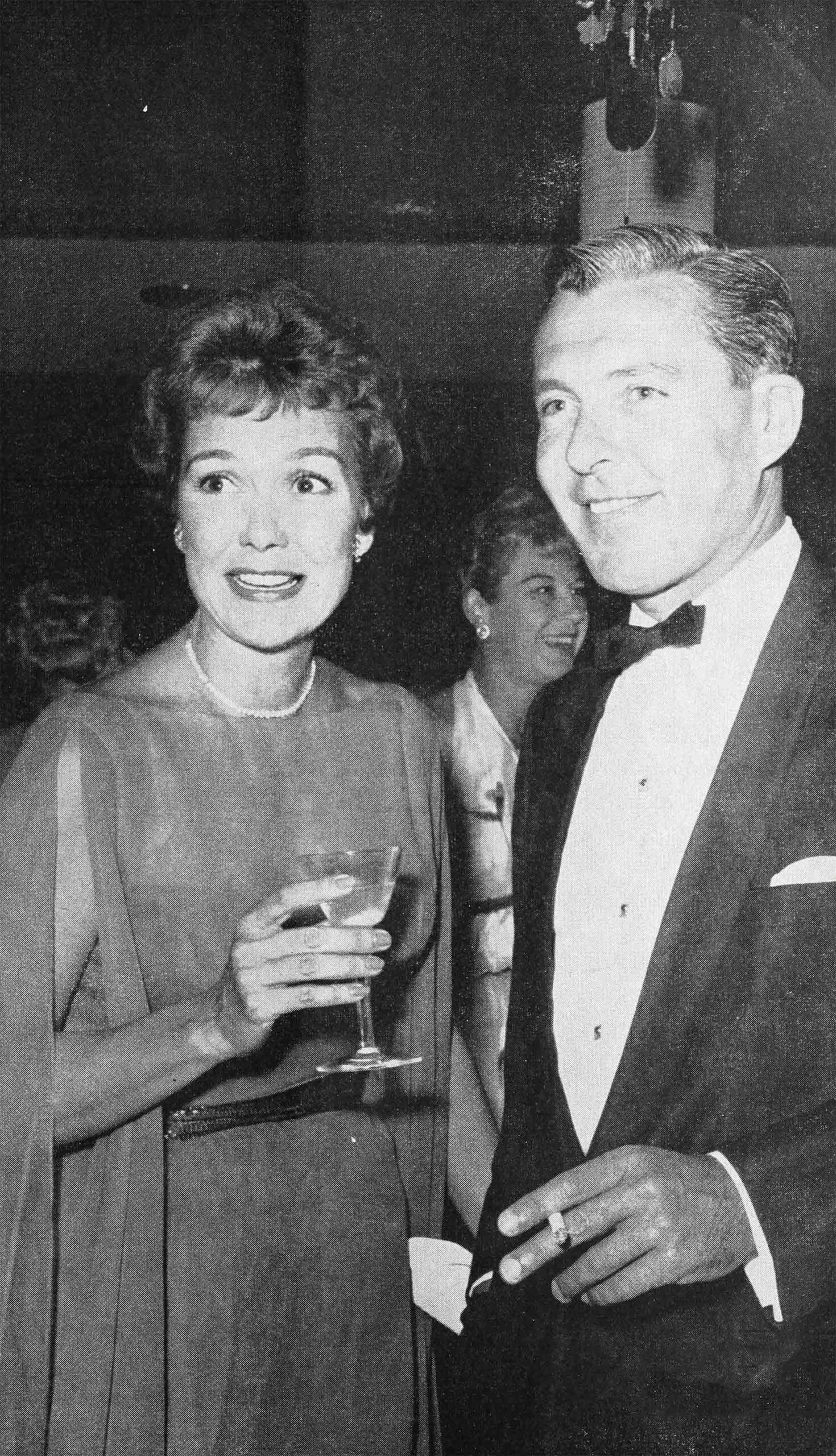
Is love Really Better The Second Time Around?—Jane Wyman & Freddie Karger
When Jane Wyman and Freddie Karger married in 1951, they said it was forever. And they believed it. But sometime after their first wedding anniversary, the stars in Jane’s eyes began to dim. Freddie wasn’t so exciting anymore. Had she made a mistake? Had he changed? Or, perhaps, had she changed? What had happened to the romance she tell in her heart when they were first married?
Two years later, they were divorced. Their friends insisted that they would he miserable apart, that they needed each other to he happy. But it seemed that Jane and Freddie felt otherwise, at least at the time, and they remained apart. Then the years, lonely years, began to pass. Something seemed to he happening, something their friends couldn’t explain. But they seemed to sense that the spark between Jane and Freddie was slowly rekindling. Some went so far as to predict that Jane would he Mrs. Karger again.
And then this year, ten years after they said their first I do’s and seven years after were divorced. Jane and Freddie were married by a priest in a quiet ceremony at Newport Beach. California.
The remarriage made headlines in the Hollywood papers, hut the story behind the headlines could he the story of any woman who thinks the moonlight and roses have gone out of her love, who, in her restlessness, feels cheated.
On their first anniversary, Freddie had taken Jane to Dave Chasen’s restaurant. It seemed so perfect then, as if their happiness would he endless. And then there was the night they had suddenly gotten the crazy urge to recapture their youth and had driven to the beach and walked along the shore into early morning.
Those had been fun days. Then, suddenly, as in so many marriages, the little things that can go wrong began to mount up. Freddie stayed late at the studio to rehearse the band—always, it seemed, after Jane had spent a long day preparing a special dish for him. He had explained to her that it was part of his job. and that he wanted a perfection from his musicians that could he achieved only through hours of hard work.
“I know, Freddie,” she used to say, “but . . .”
And, after a while, the “but’s” had come more often than kisses and the making up, and, before they knew it, the haggling had gone too far. One day they found themselves shouting at each other, saying they wished they’d never met. They didn’t mean what they said, of course, hut cruel, hurtful words, even when spoken in the heat of an argument, can never he taken hack. And the next time they fought, it was worse. The words became a little stronger, and Jane found herself saying that she could live very well without him. When he stepped out the front door, hags in hand, she realized how sorry she was, but it was too late.
As a friend put it, “Jane realized her mistake, but she was too proud to call Freddie up and admit it.”
She seemed to live in a state of shock. Some of her good friends, well-intentioned, tried to arrange dates for her with eligible men in town. But it wasn’t the same. It wasn’t Freddie.
She told one of her friends at the time:
“I realize that a lot of marriage is less exciting than what’s portrayed in the movies, but somehow you never believe yours will he hum-drum.
But. Freddie had gone, and she had tried to make the best of her life. There were good friends like Cesar Romero to take her to the premieres that she had to attend. And. though the moments with her friends were enjoyable, there was still a terrible void—the absence of love. And love to Jane was all-important.
She began going to Good Shepherd Church to pray that her lonely life would once again be filled with love. But no matter how hard she tried, she couldn’t seem to find the happiness she wanted so desperately.
Twice before, Jane had thought she’d found love and security, but both times she had been wrong. Her first marriage was to Myron Futterman, a New Orleans dress manufacturer. When they married, she was still a bit player, and for a time the marriage seemed to give her the happiness and satisfaction that she needed. But, less than a year after they married, they were divorced.
Not long afterward, she met Ronald Reagan. He was young, handsome and dashing, and all Hollywood was delighted with their story-book romance. Everything went well in the marriage until Ronald left to spend four years in the Air Force. Not only were they separated, but during the time he was away, Jane’s career picked up tremendously and she became a star. But when Ronald returned, he found that his career was taking a turn for the worst. The marriage which their friends predicted would last forever, began to waver. And, after eight years and two children, they parted.

But now, even with three divorces behind her, Jane still hoped that she could fill the void in her life.
Freddie, too, was unhappy. He began to get restless, and he told a friend, Buddy Bregman, about his problem:
“I miss her, but . . . well, I just can’t call her up and ask her to forget about my walking out.
“Why not?” asked Buddy.
Why not? Why not? Why not? Buddy’s words kept echoing in his mind.
As the days passed, he kept remembering what they had had, and what they still might have, if they could only get together and try to keep their romance alive, rather than find the flaws in each other that all humans possess. This gave him the impetus and the courage to find the right moment to cab Jane and ask her to be his guest at Starlight on the Roof. He hoped they might be able to recapture what had actually never left them—a love for each other, and for each other alone.
The first time he called, Jane had been out shopping. And when she returned to see the message saying, “Freddie called. He’ll call again,” she knew how much she had needed to hear from him.
The next day the call came early in the afternoon. His voice was so calm at first, what he said almost sounded rehearsed.
“Jane . . . I’m opening tonight at the Starlight on the Roof.”
“I know,” she heard herself answer nervously.
The pause on his end of the phone was almost too much for her to bear. She touched at the ends of a loose strand of her brown hair to calm herself.
“I’d like you to be there,” he said.
She tried to remember how many times they had gone to openings together during the days of their marriage. How many times had they danced to the tunes of a dozen bands? How many times had he kissed her softly to the tune of “Autumn Leaves”?
“I . . . I’d like to go, Freddie.”
He said he would arrange for a ringside table, and perhaps. . . .
“Perhaps we can . . . get together for a bite after the show?”
She knew what her answer would he long before the words came to her lips. She knew now, as she heard his voice, that she had been wrong during their marriage. In their years apart, she had learned she’d been wrong in thinking that it would always be a honeymoon and that a man’s moods did not belong in her picture of wedded bliss. Freddie was a creative music arranger and pianist, and he was entitled to an occasional mood. So is any man.
“I’ll he there, Freddie,” she whispered into the phone.
“Thanks, Jane,” was all he answered.
And that night as she came in, with the eyes of a thousand strangers upon her, she herself saw only one man, the man who began to play “All the Things You Are.”
As the cheers echoed through the songs that followed, Jane listened, knowing at last that the errors and mistakes and small arguments in a marriage were a part of living and loving, and that nothing, not even her career—had she let it come between them?—not even the Oscar she had won for “Johnny Belinda”—could be more precious than love.
They danced, and Freddie thought of Jack’s-at-the-Beach. where they had first come to know each other over quiet dinners during their courtship. And he thought how nice it would be to go there again.
And later, as the music of his own special night came to a close and the applause had long since stopped, he came to her, and said, very quietly, “You look lovely, Jane.”
She smiled at Freddie’s compliment, and they turned to look at each other for a long moment. Then lie took her slim little hand in his, and t heir evening began.
They talked of many things, of their first days, of what each was doing now and. most of all. what each intended to do in the future. The soft lights, the good wine, the hushed whispers, the good food—it all added up to their evening. Then, all too soon, they were driving hack to Jane’s house. Freddie stopped the car in front of the driveway.
“Jane . . . I think I made a mistake. I think. . . .”
“Maybe we both made a mistake before, Freddie.”
He looked at her. his Jane, the girl he’d spent so many happy hours with, and the soft look in her eyes gave him the courage to ask her the question he’d had on his mind all evening.
“I’d like to see you for dinner again. Tomorrow. How about it, Jane?”
Then one day Freddie said to a friend:
“I’d like to remarry Jane. Do you think she might say yes?”
The friend said it simply, but to the point: “Ask her.”
He asked, and she did say yes. And that was how it happened, how Jane and Freddie got their second chance at happiness seven years later. No wonder they both feel they’re lucky.
THE END
—BY ADAM MITCHELL
It is a quote. PHOTOPLAY MAGAZINE JULY 1961




